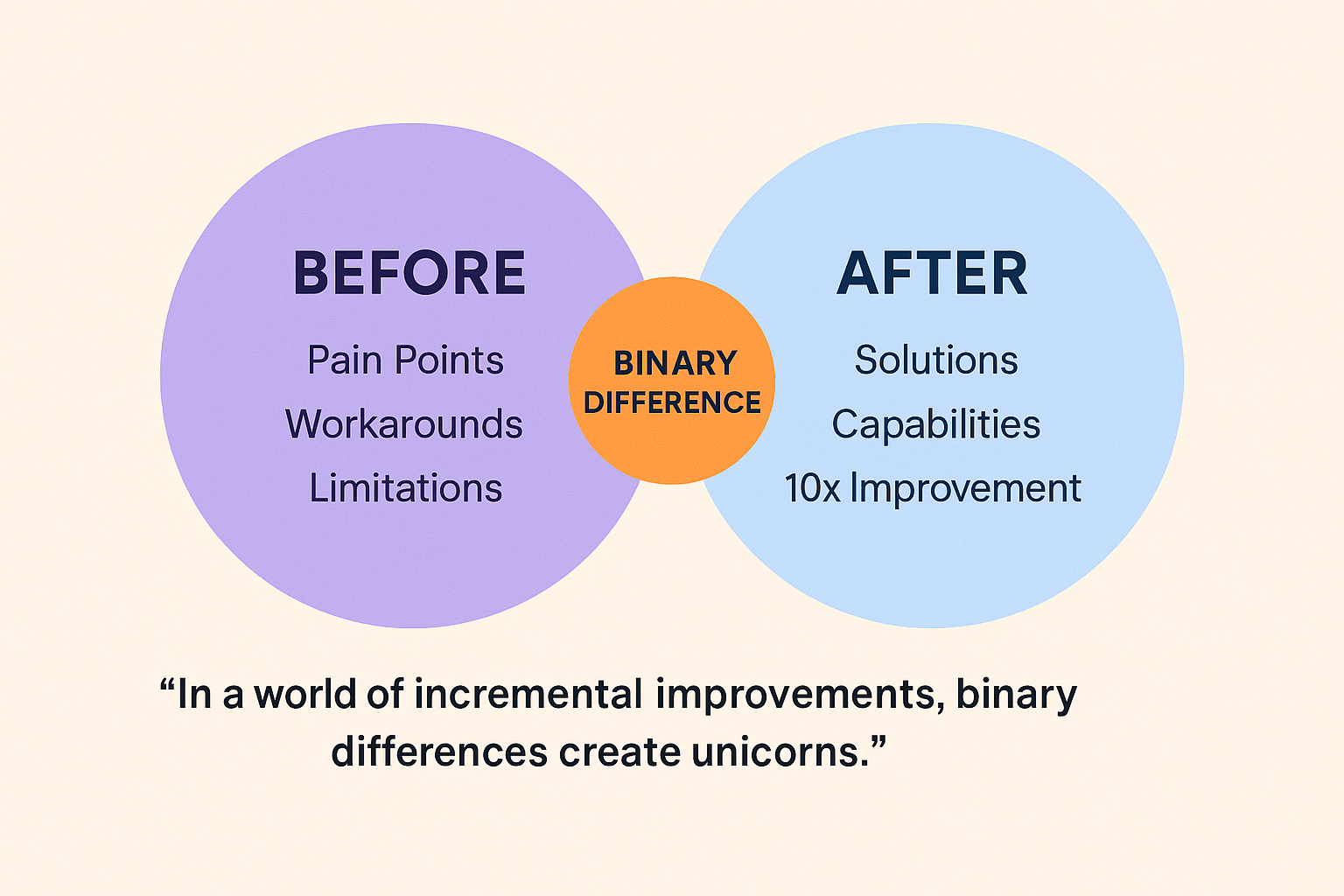The Binary Test to Evaluate Your Startup Idea

Some mornings I wake up convinced I'm building the next unicorn. Other mornings? Let's just say the imposter syndrome hits like a freight train.
If you're a founder (especially a first-timer like me), you've probably asked yourself "Is this actually a good idea?" about 500 times. I'd replay investor conversations in my head at 2AM, second-guessing every decision.
But after countless discovery calls and conversations with potential customers, I've finally figured out the one test that cuts through all the noise and uncertainty. I call it The Binary Test.
What Makes a Startup Truly Different?
Here's the brutal truth nobody tells you when you're starting out: being "better" isn't enough. Not even close.
Your startup needs to create a clear, dramatic divide between the "before you" and "after you" states of your customer's world. That's what I mean by a Binary Difference.
Think about it this way: When explaining your startup, can you honestly say "Before us, users couldn't X. After us, they can."? If not, you might be in trouble.
Binary Differences in Action
Let's look at some startups that nailed this:
Uber Before: Stand on a street corner praying a taxi appears After: Tap your phone, car shows up exactly where you are The difference: From hoping to knowing
Sentry Before: Digging through endless logs to find critical errors After: Getting instant alerts with complete context The difference: From reactive firefighting to proactive fixes
Census Before: Engineering teams building custom data pipelines for weeks After: Connecting data warehouses to apps in minutes The difference: From engineering projects to self-service
"But What About Incremental Improvements?"
I hear you. What about companies like Figma or Notion? They entered markets with existing solutions, right?
Here's the key insight: Even "better" products need a binary difference – it just might not be where you'd expect:
Figma didn't just build another design tool. They transformed how teams collaborate. Before: Email PSDs back and forth. After: Real-time collaboration with zero friction.
Notion didn't just create another doc tool. They eliminated the barrier between technical and non-technical users. Before: Different tools for different teams. After: One unified workspace for everyone.
Finding Your Own Binary Difference
So how do you apply this to your startup?
Define Your Before State What specific pain do users face right now? What awkward workarounds are they using? What's simply impossible in their current workflow?
Articulate Your After State What becomes possible with your solution? How dramatic is the improvement? (We're talking 10x, not 10%) What new capability do users gain?
Measure the Gap Time saved: Hours → Minutes Cost reduced: $000,000 → $0,000 Capability: Impossible → Possible
When You Know You've Got It
When you've found a true binary difference, customer conversations change dramatically. Instead of polite nods and "that's interesting," you start hearing:
"I've been waiting for someone to solve this!" "This would change everything about how we work." "When can we start?"
The Reality Check
Before your next pitch or product planning session, ask yourself:
- Can you explain your difference in one clear before/after sentence?
- Is the improvement dramatic enough to overcome the pain of switching?
- Would customers actively help you succeed because they need your solution so badly?
- Can you put hard numbers on the improvement?
Hard Truths
For every successful "incremental improvement" startup, countless others have failed. The ones that made it either:
- Had a hidden binary difference that wasn't obvious at first glance
- Executed so flawlessly that their user experience became the binary difference
- Had distribution advantages that compensated for smaller differentiation
Take a hard look at your startup idea. What's your binary difference? Can you state it clearly in before/after terms? Is it dramatic enough to make customers stop in their tracks?
Remember: In a world drowning in incremental improvements, binary differences are what create unicorns. 🦄